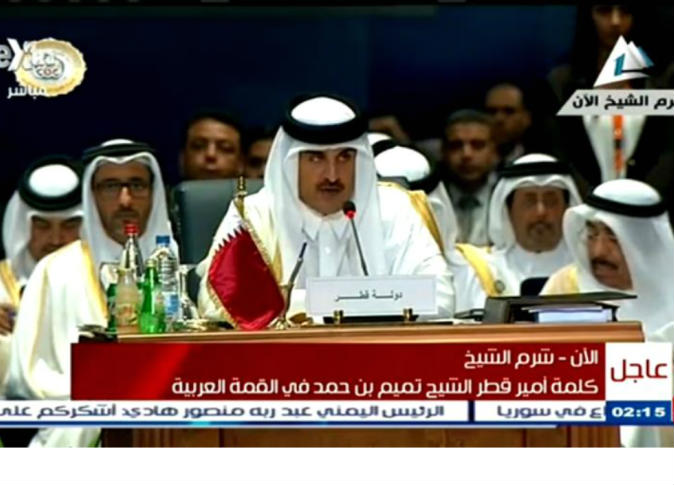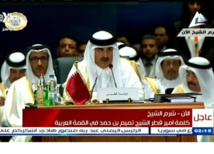President Abdel Fattah al-Sisi, who was elected after toppling his Islamist predecessor with Gulf Arab backing, has promoted his powerful army as a cornerstone of a joint Arab force.
He told the leaders of the 22-member League meeting in the Red Sea resort of Sharm el-Sheikh that the region faced an "unprecedented" threat, with unspecified powers and militants posing a danger to "its existence".
Foreign ministers meeting before the summit proper had already approved a proposal to establish a rapid response military force, which the leaders were set to adopt.
They "agreed on an important principle, to establish the force", Arab League secretary general Nabil al-Arabi told a news conference.
"This is the first time that a force will be created and work under the name of Arab states," he said, calling the move historic.
However, Iraqi Foreign Minister Ibrahim al-Jaafari said Saturday that despite Baghdad favouring the overall concept of such a force, his country still had reservations.
He told journalists that Iraq "has reservations about the formation of this force because of the lack of a preliminary study" on its creation.
The Arab leaders continued their deliberations later Saturday behind closed doors.
The Arab force issue has come to the fore with the Saudi-led offensive against Shiite Huthi rebels who took over the Yemeni capital, and large chunks of the country's west, and are now threatening the southern port of Aden.
- Backing for Yemen offensive -
Arab states, including Egypt have strongly supported the offensive, which Saudi King Salman said would continue until the Yemeni people "enjoy security".
Hadi himself called for the campaign to end only when the Huthis "surrender".
However, UN Secretary General Ban Ki-moon urged the leaders to find a peaceful resolution in Yemen.
"It is my fervent hope that at this Arab League summit, leaders will lay down clear guidelines to peacefully resolve the crisis in Yemen," he said.
Despite the support for a joint-Arab force, it would still take months to create and then operate on an ad-hoc basis.
Sisi said in a recent interview that the proposal for a joint force was welcomed especially by Jordan, which might participate alongside Saudi Arabia, the United Arab Emirates and Kuwait.
Aaron Reese, deputy research director at the Washington-based Institute for the Study of War, said "each of these countries would bring a different capability.
"The Jordanians are well known for their special forces capability... the Egyptians of course have the most manpower and bases close to Libya."
Before Egyptian air strikes in February targeting the Islamic State group (IS) in Libya, the United Arab Emirates, which shares Cairo's antipathy towards Islamists, had reportedly used Egyptian bases to launch its own air strikes there.
Egypt had sought UN backing for intervention in Libya, dismissing attempted peace talks between the rival governments in its violence-plagued North African neighbour as ineffective.
The summit is being held under tight security, with extra police and army on the streets of what is normally a tourist resort and with military aircraft patrolling overhead.
The Israeli-Palestinian peace process, as in every Arab summit, also figures on the agenda, with the IS penetration of Iraq, Syria and Libya another high priority.
-------------------------------------------------------------------------------------------------------------------------
He told the leaders of the 22-member League meeting in the Red Sea resort of Sharm el-Sheikh that the region faced an "unprecedented" threat, with unspecified powers and militants posing a danger to "its existence".
Foreign ministers meeting before the summit proper had already approved a proposal to establish a rapid response military force, which the leaders were set to adopt.
They "agreed on an important principle, to establish the force", Arab League secretary general Nabil al-Arabi told a news conference.
"This is the first time that a force will be created and work under the name of Arab states," he said, calling the move historic.
However, Iraqi Foreign Minister Ibrahim al-Jaafari said Saturday that despite Baghdad favouring the overall concept of such a force, his country still had reservations.
He told journalists that Iraq "has reservations about the formation of this force because of the lack of a preliminary study" on its creation.
The Arab leaders continued their deliberations later Saturday behind closed doors.
The Arab force issue has come to the fore with the Saudi-led offensive against Shiite Huthi rebels who took over the Yemeni capital, and large chunks of the country's west, and are now threatening the southern port of Aden.
- Backing for Yemen offensive -
Arab states, including Egypt have strongly supported the offensive, which Saudi King Salman said would continue until the Yemeni people "enjoy security".
Hadi himself called for the campaign to end only when the Huthis "surrender".
However, UN Secretary General Ban Ki-moon urged the leaders to find a peaceful resolution in Yemen.
"It is my fervent hope that at this Arab League summit, leaders will lay down clear guidelines to peacefully resolve the crisis in Yemen," he said.
Despite the support for a joint-Arab force, it would still take months to create and then operate on an ad-hoc basis.
Sisi said in a recent interview that the proposal for a joint force was welcomed especially by Jordan, which might participate alongside Saudi Arabia, the United Arab Emirates and Kuwait.
Aaron Reese, deputy research director at the Washington-based Institute for the Study of War, said "each of these countries would bring a different capability.
"The Jordanians are well known for their special forces capability... the Egyptians of course have the most manpower and bases close to Libya."
Before Egyptian air strikes in February targeting the Islamic State group (IS) in Libya, the United Arab Emirates, which shares Cairo's antipathy towards Islamists, had reportedly used Egyptian bases to launch its own air strikes there.
Egypt had sought UN backing for intervention in Libya, dismissing attempted peace talks between the rival governments in its violence-plagued North African neighbour as ineffective.
The summit is being held under tight security, with extra police and army on the streets of what is normally a tourist resort and with military aircraft patrolling overhead.
The Israeli-Palestinian peace process, as in every Arab summit, also figures on the agenda, with the IS penetration of Iraq, Syria and Libya another high priority.
-------------------------------------------------------------------------------------------------------------------------









 Home
Home Politics
Politics











